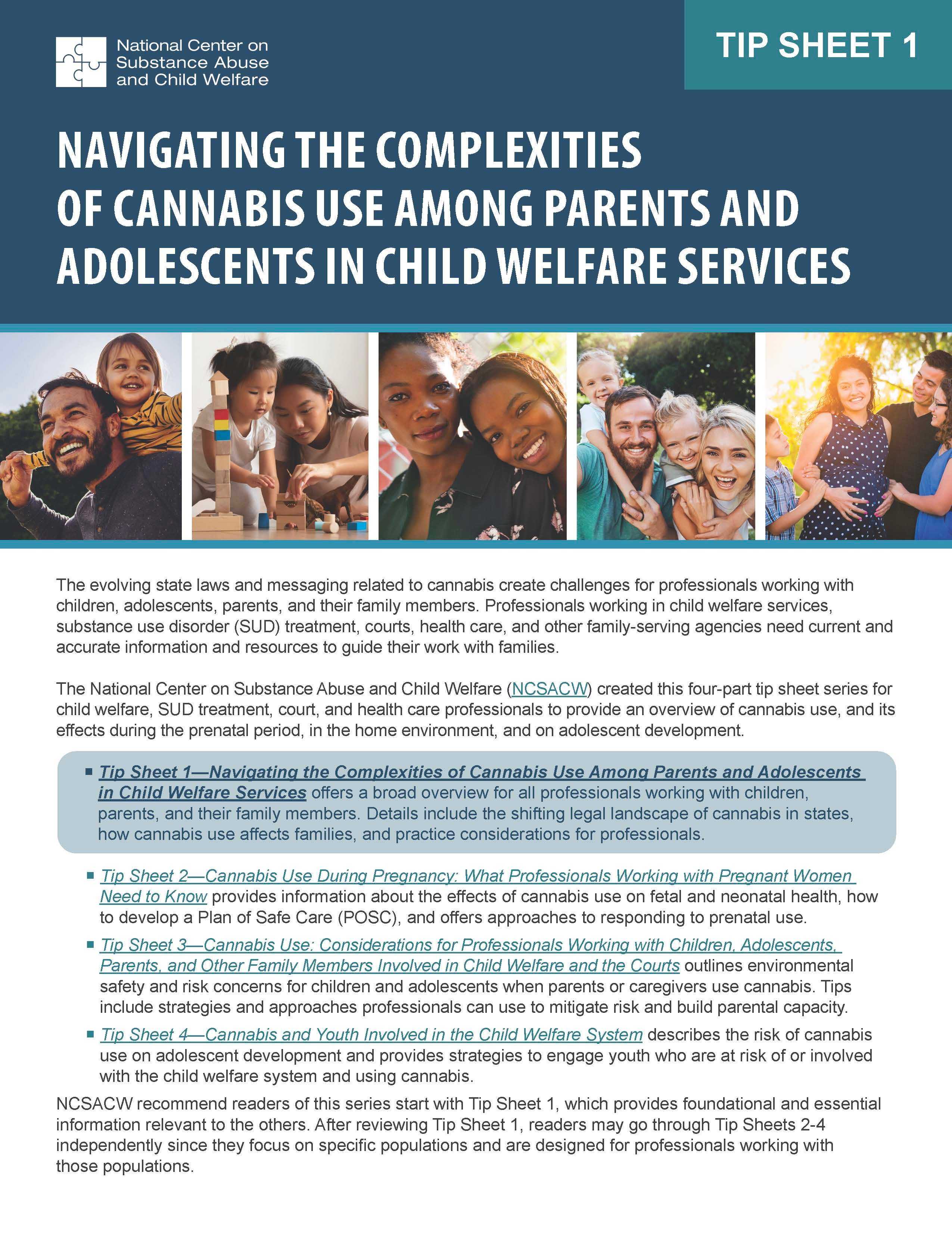Substance-Specific Resources
Specific substances may have distinct effects on the safety, health, and well-being of parents, children, and families. The tailored resources below offer helpful information and policy and practice strategies to improve service delivery and support recovery for families involved or at risk of involvement in the child welfare system.
Highlighted Resource
Cannabis Tip Sheets Series

National Center on Substance Abuse and Child Welfare, 2024
The National Center on Substance Abuse and Child Welfare (NCSACW) created this four-part tip sheet series for child welfare, SUD
...(Read More)Policy and Practice Resources
Cannabis
Cannabis and Pregnancy
U.S. Centers for Disease Control and Prevent..., 2024
Highlights the potential health effects of using cannabis during pregnancy and while
... (Read More)Cannabis Tip Sheets Series
National Center on Substance Abuse and Child..., 2024
The National Center on Substance Abuse and Child Welfare (NCSACW) created this four-part tip sheet series for child welfare, SUD
... (Read More)Advisory Cannabidiol (CBD)—Potential Harms, Side Effects, and Unknowns
Substance Abuse and Mental Health Services A..., 2023
This advisory introduces readers to cannabidiol (CBD), how it is derived, and how it
... (Read More)AllRise FAQ: Medical Marijuana
All Rise, 2022
The legalization of medical marijuana raises important questions for treatment courts
... (Read More)Preventing Marijuana Use Among Youth
Substance Abuse and Mental Health Services A..., 2021
The goal of this guide is to review the literature on the prevention of marijuana use
... (Read More)Fentanyl and Other Opioids
What You Need to Know About Youth & Fentanyl
National Council for Mental Well-Being, 2023
Offers information on fentanyl overdose deaths among adolescents and a variety of
... (Read More)Up and Away
Prevention of Overdoses and Treatment Errors..., 2023
It offers a variety of resources on safe medicine storage for families. Resources
... (Read More)LawAtlas Naloxone Overdoes Prevention Laws
Prescription Drug Abuse Policy System, 2022
Features a clickable map that provides general information about states’ naloxone
... (Read More)Stop Overdose: Implementation Toolkits
Centers for Disease Control and Prevention, 2022
Educates people who use drugs about the dangers of illegally manufactured fentanyl
... (Read More)Fentanyl Facts
Centers for Disease Control and Prevention, 2022
Provides facts on fentanyl, including information on prescribed and illicitly
... (Read More)Overdose Death Rates
National Institute on Drug Abuse, 2022
Provides data on drug overdose death rates (including fentanyl and other opioids).
... (Read More)Accidental Exposures to Fentanyl Patches Continue to Be Deadly to Children
U.S. Food and Drug Administration, 2021
Recommends safe storage and disposal of fentanyl patches to prevent child access.
... (Read More)Fentanyl Drug Facts
National Institute on Drug Abuse, 2021
Provides information on how fentanyl and other opioid use disorders are treated
... (Read More)Evidence-Based Strategies for Preventing Opioid Overdose: What’s Working in the United States
Centers for Disease Control and Prevention, 2018
Summarizes evidence-based strategies—such as targeted naloxone distribution
... (Read More)Position statement: Preventing occupational fentanyl and fentanyl analog exposure to emergency responders
American College of Medical Toxicology (ACMT..., 2017
Position paper on occupational exposure to fentanyl. Provides recommendations for
... (Read More)Methamphetamine and Other Stimulants
Treatment of Stimulant Disorders
Substance Abuse and Mental Health Services ..., 2020
This guide supports health care providers, systems, and communities seeking to treat
... (Read More)Matrix Intensive Outpatient Treatment for People with Stimulant Use Disorders: Counselor's Family Education...
Substance Abuse and Mental Health Services A..., 2016
This comprehensive kit provides substance use disorder treatment professionals with a
... (Read More)Matrix Intensive Outpatient Treatment for People With Stimulant Use Disorders: Counselor's Treatment Manual
Substance Abuse and Mental Health Services A..., 2013
This manual contains materials, such as talking points and handouts, to help
... (Read More)ATTC Network’s National Stimulant Core Curriculum
Addiction Technology Transfer Center (ATTC)..., n.d.
This training, part of a core curriculum training package, provides information about
... (Read More)Tips for Teens: The Truth About Stimulants
Substance Abuse and Mental Health Services ..., n.d.
This fact sheet describes short- and long-term stimulant effects, lists signs of use
... (Read More)State and Local Examples
Oregon Department of Human Services Child Welfare Procedure Manual
Oregon Department of Human Services, Office ..., 2024
Includes a procedure for child welfare staff to assess for cannabis use as they would
... (Read More)Los Angeles County Department of Children and Family Services (DCFS) Policy Manual
Los Angeles County DCFS Policy Institute Web..., 2023
Outlines the protocols for assessing the use of medical and recreational marijuana in
... (Read More)Marijuana Pregnancy and Breastfeeding Guidance for Health Care Providers
Nevada Division of Public and Behavioral Hea..., n.d.
With marijuana now legal in Nevada, the Division of Public and Behavioral Health
... (Read More)Additional Resources
Methamphetamine
National Institutes of Health (NIH) , n.d.
Provides information on methamphetamine and includes a brief overview, street and
... (Read More)National Alliance for Drug Endangered Children (National DEC)
National DEC provides training and technical assistance to professionals to better
... (Read More)Substance Use Prevention Resources for Youth and College Students
Substance Abuse and Mental Health Services A..., n.d.
SAMHSA offers free, downloadable publications and tip sheets, as well as mobile apps
... (Read More)“Talk. They Hear You.” Campaign
Substance Abuse and Mental Health Services A..., n.d.
SAMHSA’s national youth substance use prevention campaign helps parents and
... (Read More)